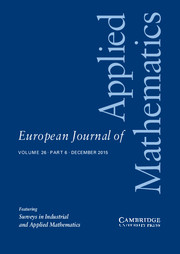Article contents
Universal algebraic convergence in time of pulled fronts: the common mechanism for difference-differential and partial differential equations
Published online by Cambridge University Press: 16 April 2002
Abstract
We analyze the front structures evolving under the difference-differential equation ∂tCj = −Cj+C2j−1 from initial conditions 0 [les ] Cj(0) [les ] 1 such that Cj(0) → 1 as j → ∞ suffciently fast. We show that the velocity v(t) of the front converges to a constant value v* according to v(t) = v*−3/(2λ*t)+(3√π/2) Dλ*/(λ*2Dt)3/2+[Oscr ](1/t2). Here v*, λ* and D are determined by the properties of the equation linearized around Cj = 1. The same asymptotic expression is valid for fronts in the nonlinear diffusion equation, where the values of the parameters λ*, v* and D are specific to the equation. The identity of methods and results for both equations is due to a common propagation mechanism of these so-called pulled fronts. This gives reasons to believe that this universal algebraic convergence actually occurs in an even larger class of equations.
- Type
- Research Article
- Information
- Copyright
- 2002 Cambridge University Press
- 6
- Cited by




